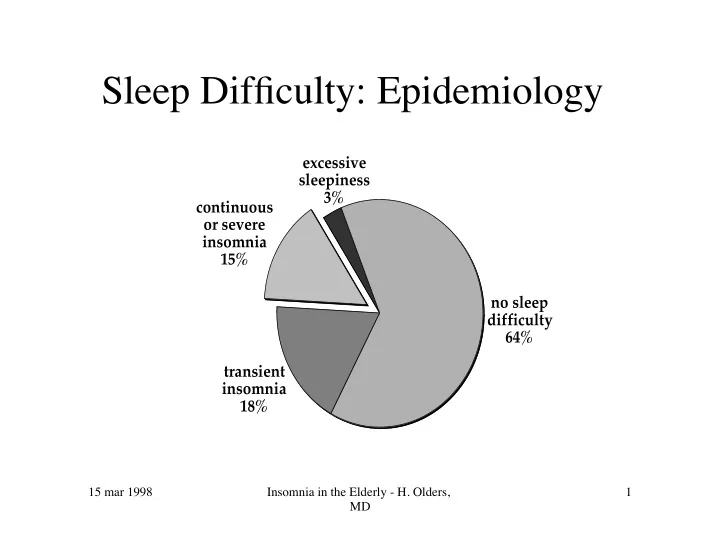

Sleep Difficulty: Epidemiology excessive sleepiness 3% continuous or severe insomnia 15% no sleep difficulty 64% transient insomnia 18% 15 mar 1998 Insomnia in the Elderly - H. Olders, 1 MD
Gallup Poll • Occasional insomnia: 27% • Regular, chronic sleep problem: 9% • Insomniacs: – Wake up feeling drowsy or tired: 72% – Wake in middle of night: 67% – Difficulty returning to sleep: 57% – Initial difficulty falling asleep: 56% – Self-medicate (alcohol or OTC drugs): 40% 15 mar 1998 Insomnia in the Elderly - H. Olders, 2 MD
Patients seen at Sleep Disorders Centers for Evaluation other Cooperative study 18% insomnia of 3900 patients 31% evaluated in 11 centres hyper- somnia 51% 15 mar 1998 Insomnia in the Elderly - H. Olders, 3 MD
Insomnia Diagnoses Personality disorder Restless legs Drug and syndrome 45% alcohol 12% dependency Sleep apnea 12% syndrome 6% Psycho- physiologic Other psychosis 15% insomnias 5% 19% Major affective disorders Psychiatric 50% insomnias breakdown Psychiatric 36% 15 mar 1998 Insomnia in the Elderly - H. Olders, 4 MD
Hypersomnia Diagnoses Other hyper- somnias 19% Sleep apnea Psychiatric syndrome 4% 43% Idiopathic hyper- somnolence 9% Narcolepsy 25% 15 mar 1998 Insomnia in the Elderly - H. Olders, 5 MD
EEG Stages of Normal Sleep • Note decrease in stage 3 and 4, and increase in awakenings, with aging • REM sleep occurs every 90 minutes, and increases through the night 15 mar 1998 Insomnia in the Elderly - H. Olders, 6 MD
Excessive REM sleep causes depression: • Medications which • Selective REM sleep increase REM sleep deprivation • Total or partial sleep • Medications which deprivation decrease REM sleep • Sleep prolongation • Sleep abnormalities in affective disorder • Sleeping late 15 mar 1998 Insomnia in the Elderly - H. Olders, 7 MD
Depression vs Arising Time p = .032 12 9.6 10 8 5.7 up before 7 am (n=29) 6 up at 7 or later (n=95) 4 2 0 Beck Depression Inventory 15 mar 1998 Insomnia in the Elderly - H. Olders, 8 MD
Fatigue vs Arising Time p=0.0094 p=0.013 8.1 7.1 6.4 5.8 5.5 up before 7 am (n=29) 4.9 4.8 from 7 up to 8 (n=35) 3.8 from 8 up to 9 (n=37) 9 am or later (n=24) chronic fatigue all fatigue 15 mar 1998 Insomnia in the Elderly - H. Olders, 9 MD
Attitudes about Sleep • Attitudes about sleep up before and sleep behaviours: 7 am 2.9 5.0 q1. If I don ’ t get • (n=29) enough sleep during the night, I should make up from 7 up 3.0 4.2 to 8 (n=35) for it by sleeping late or taking a long nap. � (agree strongly = 0; � from 8 up 2.6 4.5 to 9 (n=37) disagree strongly = 6) q2. Sometimes it ’ s • 9 am or necessary to miss work later 1.5 3.5 or school because of (n=24) lack of sleep or really q1. Sleep late q2. Miss work poor sleep. 15 mar 1998 Insomnia in the Elderly - H. Olders, 10 MD
The Scientific Literature • “ Six hours sleep for a man, � Seven for a woman, � And eight for a fool. ” � —18th century proverb • “ Early to bed, early to rise, � Makes a man healthy, wealthy, � and wise. ” � —Ben Franklin 15 mar 1998 Insomnia in the Elderly - H. Olders, 11 MD
Age-related Sleep Changes • Shorter sleep • Lower sleep efficiency • Less slow wave sleep • More awakenings • More time in bed 15 mar 1998 Insomnia in the Elderly - H. Olders, 12 MD
Insomnia is: • Distressing • Unhealthy • Dangerous • Costly 15 mar 1998 Insomnia in the Elderly - H. Olders, 13 MD
Recommend
More recommend